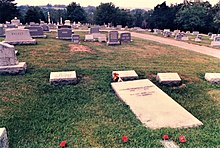Elizabeth Madox Roberts
Elizabeth Madox Roberts | |
|---|---|
 Elizabeth Madox Roberts (date unknown) | |
| Born | October 30, 1881 |
| Died | March 13, 1941 (aged 59) |
| Alma mater | University of Chicago |
| Known for | novelist and poet |
Elizabeth Madox Roberts (October 30, 1881 – March 13, 1941) was a
Life
Born in

In 1910 she went to live for several years with her sister in Colorado and it was here that she contributed several poems to a little book of photographs of mountain flowers which would become her first published work. (In the Great Steep's Garden, privately printed, 1915.) On the recommendation of a professor friend, Roberts enrolled as a freshman at the University of Chicago at the age of 36 in 1917, avidly studying literature and philosophy and fulfilling a lifelong dream of acquiring a college education. At the University of Chicago, she joined the Poetry club which included Glenway Wescott, Yvor Winters and Janet Lewis forming friendships and professional relationships. She graduated with a B.A. with honors in 1921, Phi Beta Kappa, and was awarded the Fiske Prize for a group of poems she wrote which went on to be published as Under the Tree in 1922. After completing her education, Roberts returned to Springfield, Kentucky, where she would spend much of the rest of her life.
Roberts' first novel, The Time of Man (1926), about the daughter of a Kentucky
During her career, Roberts saw her public recognition solidified by several major prizes, including the John Reed Memorial Prize in 1928, an O. Henry Award in 1930, and the Poetry Society of South Carolina's prize in 1931. The Time of Man was nominated for the Pulitzer Prize in 1926; The Great Meadow was nominated for the same award in 1930.[1][2] Robert Penn Warren spoke admiringly of her work,[3] once calling her "that rare thing, a true artist".[4]
Roberts died in Orlando, Florida in 1941 and was returned home to Springfield for her burial.
In 2012, Dr. Victoria Barker, an English professor at
Bibliography
- In the Great Steep's Garden (1915)
- Under the Tree (1922)
- The Time of Man (1926)
- My Heart and My Flesh (1927)
- Jingling in the Wind (1928)
- The Great Meadow (1930)
- A Buried Treasure (1931)
- The Haunted Mirror (1932)
- He Sent Forth a Raven (1935)
- Black Is My True Love's Hair (1938)
- Song in the Meadow (1940)
- Not by Strange Gods (1941)
- Flood (2012)
References
- ^ "Biography of Elizabeth Madox Roberts – Elizabeth Madox Roberts Society". emrsociety.com. Retrieved 15 June 2018.
- ISBN 978-0-87972-593-8.
- ^ "The University Bookman: The 'Time' of Elizabeth Madox Roberts". www.kirkcenter.org. 30 November 2008. Retrieved 15 June 2018.
- ISBN 978-0-8071-5283-6.
Sources
- "Elizabeth Madox Roberts (1881–1941)" in Fifty Southern Writers After 1900, Greenwood Press, 1987.
- "Elizabeth Madox Roberts" in Notable American Women, Belknap Press, 2005.
- KYLIT: Elizabeth Madox Roberts
External links
- Elizabeth Madox Roberts Society
- Works by Elizabeth Madox Roberts at Project Gutenberg
- Works by Elizabeth Madox Roberts at Faded Page (Canada)
- Works by or about Elizabeth Madox Roberts at Internet Archive
- Full Text of Under the Tree
- Digitized images of the Collection on Elizabeth Madox Roberts, 1913, housed at the University of Kentucky Libraries Special Collections Research Center
